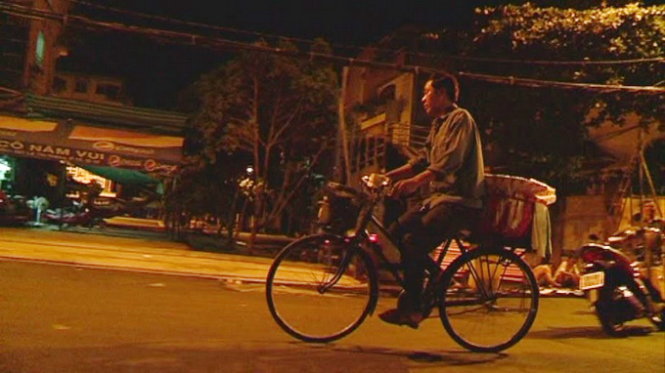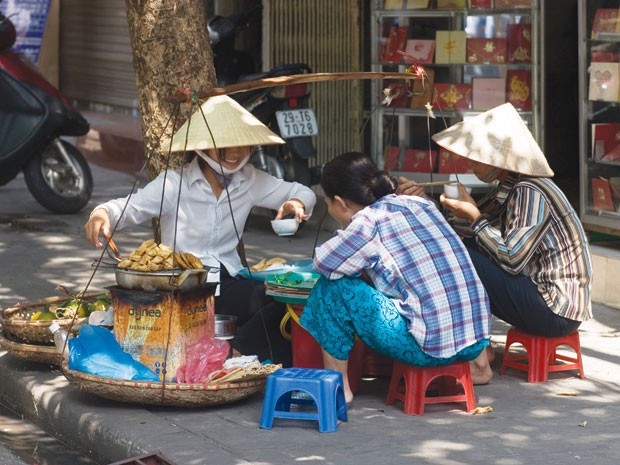In a quiet corner of Ho Chi Minh City, mornings used to begin not with alarms, but with voices echoing through the narrow alleyways. Some were loud and clear, others soft and almost sing-song, sometimes crackling through old speakers, yet all instantly recognizable. These were tiếng rao, the street cries of Vietnam. They were calls from vendors roaming the streets with their goods: steaming bánh giò (rice dumplings), ripe tropical fruits, sugarcane juice, fresh bread, or even mobile knife-sharpening services.
If you’ve never lived here, you might miss it entirely. You might not notice the subtle presence of these cries, echoing down alleyways or bouncing off concrete walls. But to me, and to many Vietnamese, tiếng rao isn’t just about selling things. It’s about memory, community, and the rhythm of everyday life.
What Is "Tiếng Rao"?
“Tiếng rao” simply means “cry” or “call” in Vietnamese. But culturally, it refers to the sing-song calls of street vendors as they move through towns and cities, announcing what they are selling. These cries might be live, called out by the vendor’s own voice, or pre-recorded and played on a speaker tied to the side of a bicycle, cart, or motorbike.
“Bánh mì bơ sữa” - a familiar cry echoing through the streets, captured in a moment I filmed.
Their cries serve as a moving advertisement, one that’s passed down, memorized, and uniquely tailored. No two cries are exactly alike.
That’s what makes it special. These announcements are rhythmic, poetic, and surprisingly creative. A good tiếng rao is short, easy to remember, and sometimes even rhymes. When I was a child, I didn’t even have to look out the window; I could hear a phrase and know exactly who was outside and what they were selling.
A Living Soundtrack
Tiếng rao comes at all hours. Mornings are busiest, of course. But even during the quietest moments, high noon when the city naps, or late at night when most are asleep, a lone voice might still pass by. There’s something oddly comforting about that: the city never truly stops. Somewhere, someone is still out there, working, calling, connecting.

One of my favorite things growing up was sitting by the window trying to guess the product just from the tone and rhythm. "Ai ve chai, lông vịt, dép đứt, thau nhôm, đồ mủ đồ bể bán hôn?" (“Anyone selling scrap, duck feathers, broken sandals, aluminum basins, plastic wares, or damaged items?”) or “Bánh chưng bánh giò, chưng gai bánh giò…” (“Bánh chưng, bánh giò! Steamed bánh chưng, bánh giò here…”). Children like me would dash to our parents, pleading for a little cash to run outside and catch the vendor before they moved on.
Buying something from them comes with a chat, a small laugh, a hello to someone you saw every other day. They knew who liked which snack, and we knew what time they usually came by. It created a kind of invisible bond.
Why It's Fading
As the years passed, I started to notice subtle shifts.
Vendors began switching to small loudspeakers, playing recorded versions of their cries. The sound carried further and never lost breath, but it also lost some of the warmth. The rhythm became too even, the voice too mechanical. It didn’t feel like a person was speaking to me anymore.
Eventually, even those recorded calls began to disappear. The streets grew noisier in other ways: LED screens flashing ads, delivery bikes zooming by, livestreams selling everything from food to clothes. In the rush of modern life, it seemed fewer people were listening for a voice drifting down the alley.

It wasn’t until the pandemic quieted everything that I truly noticed what had faded. The streets felt strangely empty, not just in movement, but in sound. That’s when I truly noticed the absence. For the first time, I realized how much those cries had been a part of my life. And I missed it more than I expected.

Tiếng rao might seem like just another sound on the street, but to many Vietnamese, it’s a reminder of simple moments: childhood afternoons, quiet alleys, and the gentle bond between seller and passerby. Every call carries with it someone’s quiet persistence - a person biking under the sun or rain, bringing warm food and a familiar voice to our doorstep.
To visitors, Vietnam can feel fast-paced, chaotic even. But pause long enough, and you might hear something drifting down a quiet street, might be a fragment of melody, a voice calling softly. That’s tiếng rao.
And if you hear it, listen carefully. Because in that simple sound lives the heartbeat of a city.
